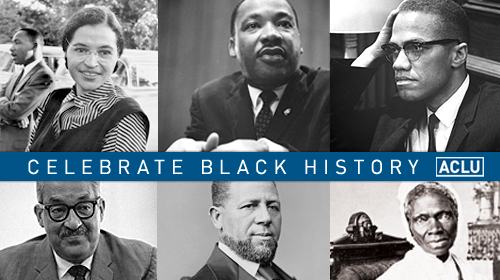
Recently, a colleague here at the ACLU sent around a story about an African-American woman’s experience giving birth that literally left me crying at my desk.
, was written in the aftermath of the Blue Ivy Carter, , but I’m sure Bey wouldn’t be able to relate to what Denene Millner went through. In advance of giving birth, Denene paid $800 on top of usual hospital fees for what she describes as a “Cadillac birthing experience.” Instead of receiving the posh experience she paid for she “was treated like a 14-year-old drug-addicted welfare queen, there to push out yet another daddy-less baby.” Her baby was immediately (and inexplicably) tested for drugs, she was put in a crowded room with other mothers and infants, was treated rudely by hostile hospital staff that were surprised when her husband walked in because who could ever believe a Black woman would be married when she has a child?
It brought to mind “” delivered by Sojourner Truth in the 1850s. In that speech she made the point that Black women are generally treated differently than other women. That remains true, particularly when it comes to the politics of motherhood and access to the full range of reproductive health services.

Alicia Gay is a senior communications strategist for the Center of Liberty at the national ACLU; this is her second tenure with the ACLU. Her past experience includes developing social media campaigns, creating extensive messaging platforms and conducting media outreach. Alicia has a B.A. in Public Policy from Brown University.
Let me pause here. This is Black History Month, a time when we reflect on the challenges and accomplishments faced by the African-American community. Let’s be honest – I am not Rosa Parks. I am writing this from a place of privilege. I went to an Ivy League school and have never (I don’t think) been denied opportunities because of what I look like. My worst experience with our justice system was being detained at the police station when I was 13 because my best friend and I broke the curfew in the small suburb where I grew up and made the mistake of asking the cop if he was looking for doughnuts when he picked us up. I am Privileged. Denene who could afford to pay nearly $800 extra for a private room and a lobster dinner at the hospital is also Privileged.
And you know what? It doesn’t matter. When it comes to notions of motherhood, pregnancy, abortion and the essential reproductive choices that women make every day, Black women are considered imperfect, less than, and irresponsible – regardless of her personal circumstances.
Of course all women in this country, regardless of race, face tremendous threats to access to reproductive services. Just look at this Crazy controversy over birth control and the Komen dustup.
Over the past couple years there has been an increased effort to target and stigmatize African-American women who have had, or may elect to have an abortion. Anti-choice extremists have been able to get away with targeting Black women precisely because of the attitudes that shaped how Denene was treated in that hospital, and that’s the notion that Black women in particular don’t make “good” choices.
Just look at the ill-named Susan B. Anthony and Frederick Douglass Prenatal Nondiscrimination Act introduced by Rep. Trent Franks. The bill, among other things, is designed to protect Black babies from… Black mothers? Proponents of the legislation wrote "Abortion is the leading cause of death in the black community" and has become "a tool of sex and race discrimination in America for both individuals and government." The policy would require doctors to question women prior to performing an abortion to make sure they aren’t having an abortion because of the race/sex of the fetus.
To which I would like to reply: Ain’t I a woman Rep. Franks? Aren’t I best positioned to decide when I bring a child into the world? Why do you think that women who look like me are more likely to “discriminate” against our own race?
Last spring and summer in states across the country, anti-choice groups again connected abortion to racial genocide (and slavery too!) this time through . Groups like LifeAlways, Heroic Media and the Radiance Foundation paid for these billboards which screamed in huge letters “The most dangerous place for an African-American is in the womb” and, above a Black infant, “Back is Beautiful – toomanyaborted.com.”
Hey funders of these racist ads, ain’t I woman? Why are you suggesting that my reproductive choices are more damaging to a generation of African-Americans than slavery? Ain’t I a woman who deserves to have the structural, economic and institutional barriers that contribute to higher rates of unintended pregnancy addressed rather than accused of being a race traitor and murderer?
I could go on and talk about the so-called “personhood” initiatives and how supporters of these policies intentionally invoke language designed to remind African-Americans of the Dred Scott decision and a time when our status as people was questioned. Ain’t I a woman who deserves a less cynical co-opting of history?
It’s 2012 and I am a Black woman. I will continue to make decisions everyday about sex and about when and how I want to start a family. I may face a health-threatening pregnancy or have a baby in the finest luxury birthing suite I can afford. Who knows what the future will bring, all I can hope for is that the wider world will respect me as much as any other woman, and trust that I know what’s best for me and my family.
This blog post is one of several personal testimonials written by ACLU staff members to commemorate Black History Month.
Do you know who’s pictured in our Celebrate Black History logo? Top row, from left to right: , and . Bottom row, from left to right: , and .
Learn more about racial justice: Sign up for breaking news alerts, , and .

